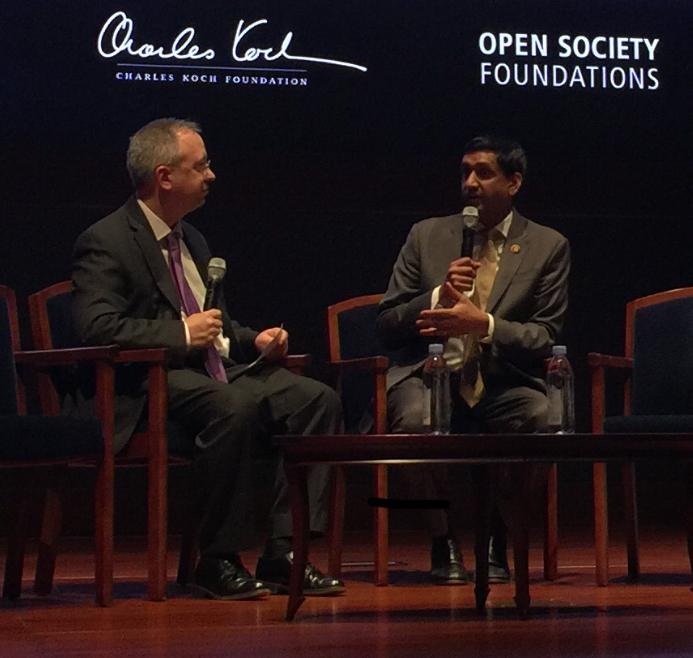Non-interventionists are not used to having a seat at the power table. Lacking any amount of institutional influence, believers in the anti-war cause are used to spending careers tinkering at the margins of the conversation, living from hand to mouth off of minimal fundraising. No one ever got rich towing the line for “Big Peace.”
This unfortunate situation has, over decades, left a cynicism for anything located in the beltway of Washington D.C. That’s where principles go to die, and good people go to sell out, don’t you know?
This characterization is far from unfounded. There is an endless list of grifters, double-crossers, and Fausts who have sold their soul for a couple zeros added to their paychecks. But should past betrayals define our attitudes to the possibilities of the future?
In the past week, the Quincy Institute for Responsible Statecraft held its first event since its inaugural launch in December. Named after former secretary of state John Quincy Adams and founded through big money donations from billionaires Charles Koch and George Soros (among others), the think tank was established, in the words of Chairwoman Suzanne DiMaggio, “to bring about a fundamental reorientation in U.S. foreign policy.”
The event, titled “A New Vision for America in the World,” was pilloried before it even occurred. Criticism revolved around the speaker’s list, which included individuals who had spent years advocating, defending, and even participating in military adventurism overseas. This is where a dose of context is important.
The event was pitched as a forum between the Quincy Institute and Foreign Policy, whose conception of its eponymous topic is decidedly status quo hegemony. Registration, the speaker’s list, and the day’s schedule were available exclusively on Foreign Policy’s website. Quincy was discernably the junior partner in the conversation.
Each side chose its champion. Foreign Policy originated the idea to host disgraced former Major General David Petraeus, who commanded U.S. forces in both Iraq and Afghanistan. Since his conviction for sharing state secrets with his mistress as Director of the CIA, Petraeus has spent years attempting to rehabilitate his image and spread the gospel of counterinsurgency that failed American forces in the Middle East.
In opposition stood Democratic Congressman Ro Khanna of California. A self-described “progressive capitalist,” since his election in 2016 Khanna has made a name for himself as a voice for military restraint in Washington. He’s done more legwork to stop American support for the Saudi-led intervention in Yemen than any other member of congress.
The event’s original conception was to have a debate between Petraeus and Khanna on stage, where the two could challenge each other directly. Petraeus refused to countenance this option, a Quincy insider revealed to the Libertarian Institute. So instead each man sat down, back-to-back, with their respective interlocutors; Petraeus with Foreign Policy Editor-In-Chief Jonathan Tepperman, and Khanna with the Charles Koch Institute’s Vice President for Research and Policy Will Ruger.
Tepperman opened his segment with a joke that fell on deaf ears. “Our next guest will be immediately recognizable to all of you, I’m sure, unless you’ve been living under a rock for the last twenty years,” he smiled. “That’s ‘under a rock,’ not ‘living in Iraq,’ in which case you would definitely recognize him.” Try telling that one-liner to the Iraqi teenagers who have gone their entire lives without clean drinking water, or the Iraqi men who continue to live without arms or legs, or the Iraqi mothers who gave birth to babies with abominable birth defects because of America’s use of depleted uranium ammunition. Yes, I’m sure they’d definitely recognize David Petraeus.
The proceeding twenty-four minutes of dialogue was the same insipid pablum that Petraeus has used to justify his speaking fees for a decade. The United States must remain stationed in Afghanistan to keep an Al-Qaeda sanctuary from being reestablished, he argued. “There is some affinity they have for Eastern Afghanistan,” the former general said, even though the reasoning “was lost on me.”
Would Petraeus be open to a reassessment of U.S. strategic interests; the kind of retrenchment advocated by the Quincy Institute? “I think, to be perfectly honest, the debate here—should we be more restrained—of course we should be more restrained,” he answered coyly. “Until we shouldn’t.”
When Congressman Khanna began his segment afterwards, he wasted no time in cutting Petraeus down to size. “I thought the title of this conference is ‘A New Vision for American Foreign Policy,’” Khanna said, “and I was wondering when he was going to say something new that we haven’t heard for the last twenty years.”
“If I understood General Petraeus, he’s basically saying we need to have a permanent troop presence around the world, in any place that’s a failed state. I mean I thought we were a republic. I thought that was totally counter to what our founder’s envisioned,” explained Khanna.
While he displayed a depth of knowledge on U.S. conduct overseas far exceeding the average representative, it was Khanna’s conception of America’s metaphysical place in the world that stood out most prominently. When foreigners think of the United States, he hopes their first thoughts are “our culture, our art, our technology, our writings [that] reflect those values.”
“I don’t want…the first thing when they think about the United States [to be] our military or bombs,” he said resolutely. This sentiment brought to mind that cataloger of American localism, Bill Kauffman, who lambasted the “sham patriotism” of “the chickenhawk who loves little of his country beyond its military might.”
Ro Khanna holds to that older notion of America, of a republic on a human scale that focuses on its own betterment, not the siren song of empire. “I think every member of congress should read John Quincy Adams. He’s more eloquent than all of us put together,” he counseled.
Unfortunately, Petraeus had already departed out the side door before he could be infected with anyone else’s perspective. He had a better exit strategy from the conference than he ever did in Iraq or Afghanistan.
So lopsided was the “exchange” that after Khanna concluded Tepperman felt the need to defend his interviewee. “There was a big mismatch between Petraeus and Khanna. In the sense that, Ro Khanna is a politician. David Petraeus is not a politician,” he said, eliciting an eyeroll from Ruger. The absurdity to claim that Petraeus, who earned the antagonism of his fellow commanders by being one of the most outwardly political generals in modern American history, obliged Tepperman to admit moments later that, “Petraeus is a better politician than most.”
Outside the main attraction, the conference also included a discussion between two other House members, and three theater-focused foreign policy panels. Each panel’s membership was split between people selected by Quincy and those selected by Foreign Policy, allowing a more open exchange of ideas than usually seen in the beltway. The Quincy Institute’s staff, particularly Managing Director for Research and Policy Sarah Leah Whitson, ably articulated the concepts of realism and drawing back from our seemingly endless wars.
Some purists will still complain that the Quincy Institute soiled itself by cohosting its first conference with Foreign Policy, and for allowing the likes of Petraeus to speak. But the fact is, Quincy created a space where a sitting congressman could publicly clown the man who lost America’s two twenty-first century invasions. It created a space where renowned Pentagon reporter Mark Perry could rile the audience into a frenzy like a Rockstar performing a set of his greatest hits. And it created a space where Code Pink co-founder Medea Benjamin could be cheered by a crowd for interrogating a panelist about his financial connections to Saudi Arabia.
This new, freer environment is something to be celebrated. The Quincy Institute for Responsible Statecraft might have started the forum as the unofficial junior partner to Foreign Policy, but it closed it by punching above its weight class.








